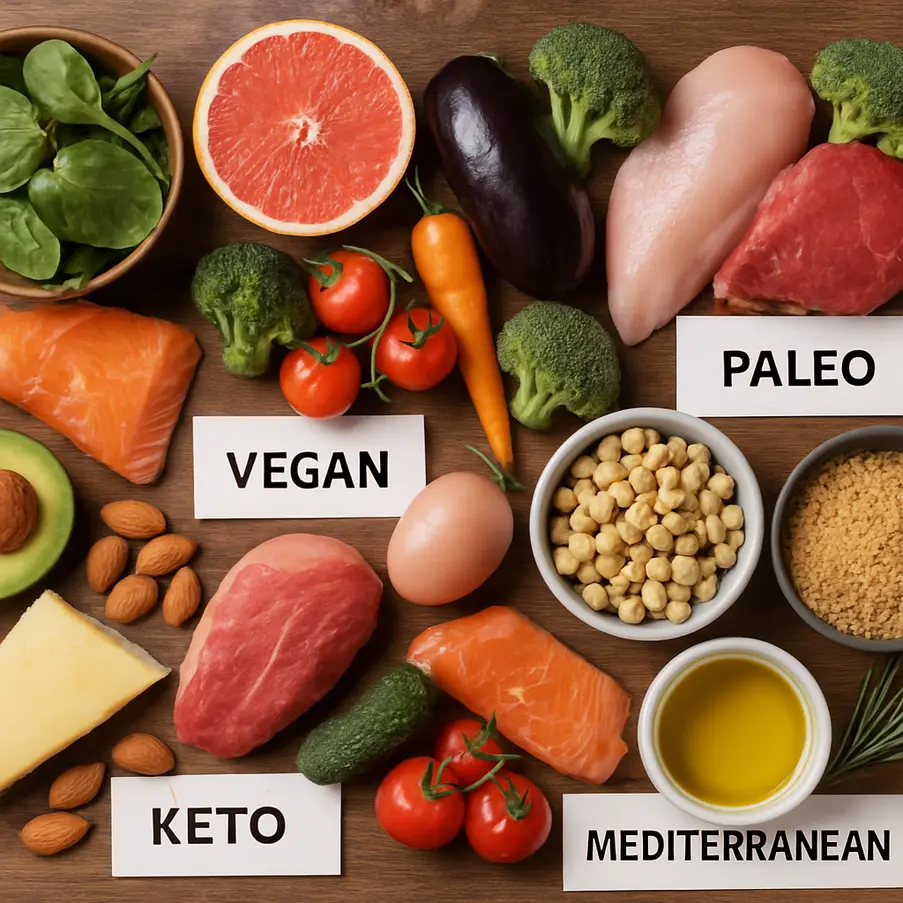Comparison of Popular Diet Plans
The quest for the perfect diet plan has become a prevalent topic of discussion. With an array of popular diet plans promising everything from weight loss to improved health and vitality, one might wonder which really deliver. Some diets focus on calories, others on macronutrients, while some emphasize timing or food source quality. This comparison of popular diet plans unravels their core principles, benefits, and potential drawbacks to provide a clearer understanding of which diet might best align with different health goals and lifestyles.
The Science Behind Ketogenic and Low-Carb Diets
Ketogenic and low-carb diets have surged in popularity, largely due to their potential for significant weight loss and metabolic transformation. At their core, these diets focus on severely reducing carbohydrate intake, which forces the body into a metabolic state known as ketosis. In ketosis, the body shifts from burning glucose for energy to breaking down fats into molecules called ketones, which it then uses as fuel.
Biologically, this change can have profound effects. By limiting carbohydrates, insulin levels—a hormone that promotes fat storage—drop significantly, enabling the body to access and burn stored fat more efficiently. This process not only supports weight loss but can also stabilize blood sugar and improve insulin sensitivity, offering potential benefits for individuals with type 2 diabetes. Studies have shown that ketogenic diets can lead to more substantial weight loss and better long-term health markers compared to low-fat diets.
However, it’s crucial to approach these diets with an understanding of potential risks and misconceptions. One common misconception is that all fats are healthy, leading some to consume unhealthy trans fats in processed foods. To maintain a balanced diet, focusing on high-quality, whole-food sources like avocados, nuts, and olive oil is essential. Additionally, some people may experience the so-called “keto flu”—a collection of symptoms like fatigue and irritability as the body adapts.
Long-term adherence to strict low-carb diets may also impact nutrient intake. It’s essential to ensure that the diet includes plenty of non-starchy vegetables and a variety of protein sources to avoid nutritional deficiencies. Monitoring one’s health through regular check-ups can help mitigate these risks, particularly since excessive protein or fat intake might have unforeseen health consequences over time.
For those embarking on a fitness journey or integrating a new diet plan, finding the right tools is crucial. Considering a fitness tracker can provide valuable feedback on your progress and help tailor your regimen accordingly. This holistic approach ensures that dietary changes not only support weight loss but also contribute to overall wellbeing.
Understanding the Mediterranean Diet’s Nutritional Philosophy
The Mediterranean diet focuses on heart health through a blend of whole foods, healthy fats, and an integrated lifestyle. Unlike restrictive calorie counting, it embraces nutrient-rich ingredients like fruits, vegetables, whole grains, and legumes. This combination fosters a sense of balance and holistic health, making the Mediterranean diet a sustainable long-term choice.
Central to this diet is the inclusion of healthy fats, predominantly from olive oil, nuts, and seeds. These fats support heart health through monounsaturated fatty acids and antioxidants. Olive oil, revered for being rich in polyphenols, reduces inflammation and lowers the risk of cardiovascular diseases. Incorporating these fats encourages the consumption of delightful and varied meals that rarely feel like a typical diet.
Protein in the Mediterranean diet primarily comes from seafood, an essential ingredient due to its high omega-3 fatty acid content. These components are linked to improved heart function and cognitive health. Consuming fish regularly shifts the dietary focus towards plant-based proteins, reducing red meat reliance, which is limited to just a few occasions a month. This naturally reduces saturated fat intake, benefiting overall metabolic health.
The enjoyment of meals is paramount, promoting a slow and mindful eating experience. Sharing meals with family or friends is an integral practice, amplifying the social and emotional aspects of dining. This participation in communal meals deepens the connection to food and mindfulness in eating, often leading to better digestion and portion control.
For those considering the Mediterranean approach, it is beneficial to explore different ways to include more plants in your diet. A resourceful way to start is by seeking foods that complement this lifestyle, such as those suggested in our best foods for daily health routine. This lifestyle doesn’t merely change what you eat—it’s an invitation to a nourishing culinary journey. Through this, it’s evident why the Mediterranean diet has long topped charts as a healthful, delicious way to live.
Mitolyn Product
Exploring Plant-Based Diets: Vegan and Vegetarian Choices
Plant-based diets, particularly vegan and vegetarian lifestyles, center around minimizing or eliminating animal products. Though similar, these two approaches have distinct differences. Vegans exclude all animal-derived products from their diet, meaning no meat, dairy, eggs, or even honey. Vegetarians, on the other hand, avoid meat but often include dairy and eggs in their meals.
One of the major draws of adopting a plant-based diet is its plethora of health benefits. Reducing meat consumption is linked to lower risks of cardiovascular disease and certain cancers. Additionally, a diet rich in fruits, vegetables, nuts, and whole grains provides essential nutrients and promotes gut health. Studies suggest that plant-based diets can also support weight management, improving the body’s ability to burn fat and reduce belly fat.
However, shedding light on these benefits mustn’t overshadow some of the nutritional challenges that might arise. Iron, vitamin B12, omega-3 fatty acids, calcium, and protein are nutrients more readily available in animal products. Vegans, in particular, should be vigilant and plan to fulfill these nutritional needs adequately.
To maintain a balanced vegan or vegetarian diet, strategic meal planning is crucial. Iron can be sourced from beans, lentils, and fortified cereals, though pairing them with vitamin C-rich foods enhances absorption. B12 supplements or fortified foods are essential for vegans to avoid deficiencies. Flaxseeds, chia seeds, and walnuts serve as plant-based omega-3s, while calcium can be found in leafy greens, almonds, and fortified plant milk.
Emphasizing diversity in your plant-based diet encourages the intake of a broader spectrum of nutrients. Incorporating various legumes, grains, seeds, and vegetables not only boosts nutrition but keeps meals exciting. For those new to this journey, consider visiting the best foods for daily health routine, which could offer valuable guidance on quality plant-based options.
Whether motivated by health concerns, environmental considerations, or ethical beliefs, adopting a vegan or vegetarian lifestyle can be both rewarding and challenging. With informed choices and thoughtful planning, it’s possible to enjoy a nutritionally complete, plant-based diet without compromising on taste or health.
Intermittent Fasting: Benefits, Challenges, and Variations
Intermittent fasting (IF) is more than just a dietary trend; it’s an intentional method of eating that can provide significant health benefits. At its core, IF revolves around cycles of eating and fasting, allowing the body to enter a state where it can repair and rejuvenate itself. This method encourages metabolic health, which can lead to weight loss, improved energy levels, and potentially extend longevity.
Breaking down the process, intermittent fasting allows your body to spend more time in a fasted state, promoting fat storage utilization and enhanced insulin sensitivity. Reduced calorie intake in fasting periods may increase focus and mental clarity. A deeper dive into these benefits can illuminate how fasting improves aspects of physical and mental well-being. For more details on the benefits, our dedicated article on the benefits of intermittent fasting for health offers comprehensive insights.
There are several variations of IF, catering to different needs and lifestyles. Popular methods include the 16/8 method, where eating is restricted to an eight-hour window, typically from noon to 8 PM. Alternatively, the 5:2 diet allows you to eat normally five days a week, with calorie consumption drastically reduced on the other two. Each method offers unique benefits and suits different routines, allowing practitioners to choose what fits them best.
Despite its benefits, intermittent fasting isn’t without challenges. Many beginners face initial hunger and cravings, especially when transitioning from traditional eating patterns. This psychological hurdle can often discourage continuation. However, strategies like staying hydrated and gradually increasing fasting periods can help ease transitions. Additionally, physical adaptations, such as adjusting energy levels and mood fluctuations, can impact the fasting experience.
It’s essential to recognize the psychological effects that accompany fasting. Feelings of deprivation might occur, particularly in the beginning stages. Yet, many find a sense of empowerment and improved mindfulness with food, which can lead to healthier long-term eating habits. Intermittent fasting isn’t a one-size-fits-all plan, and consulting a healthcare provider before starting can ensure it’s a safe choice for you.
As you embrace intermittent fasting, remember that success often comes through flexibility and persistence. Monitor your body’s responses, and don’t hesitate to adjust your approach to integrate this powerful diet more seamlessly into your life.
Final words Comparison of Popular Diet Plans
Having explored various popular diet plans, it is evident that no singular approach suits all individuals. Dietary preferences and health goals vary significantly, making it crucial to consider personal needs and consult professionals when choosing a diet plan. As you navigate through dietary changes, remember that each plan offers unique benefits and challenges. Continuous investigation into dietary practices can empower you with the knowledge to make informed dietary choices. I invite you to explore further articles on our site, where we dissect more health-related topics.




